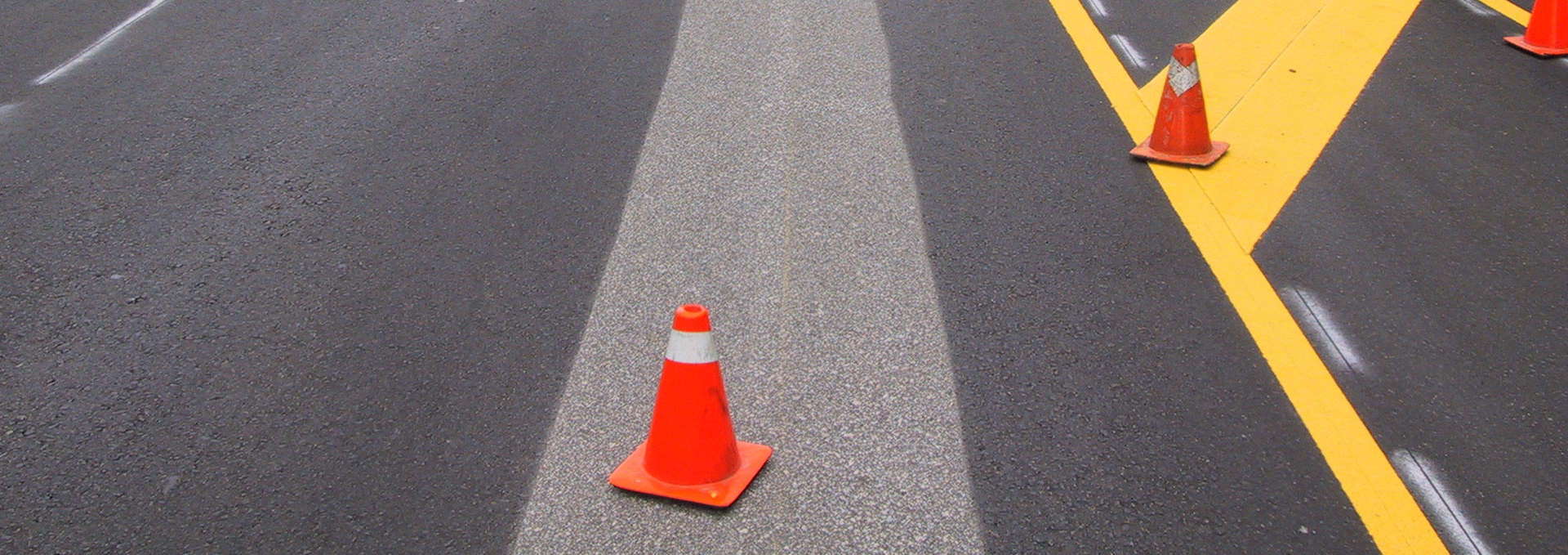Road and Construction Projects
Every year, Delta undertakes Road Improvement Projects as part of our commitment to improving the transportation system for residents. Sites are selected based on a number of factors including community needs, school routes, pedestrian safety, pavement condition, and other utility upgrade needs such as water or sewer mains.
Want to know what’s happening in your neighbourhood? Contact the Engineering Department by:
Telephone 604-946-3260
Email engineering@delta.ca
To ensure safe and smooth travel, make sure to read our winter preparedness tips and please check the roads advisories and construction activities below. Find current road conditions with Drive BC.
Looking to initiate a traffic calming project for a neighbourhood or street? Please see the Neighbourhood Traffic Calming Policy and Procedures for more information on neighbourhood traffic calming. The document addresses the programming, process and funding aspects of traffic calming projects. If you have any questions, please contact the Engineering Department by phone at 604-946-3260 or by email.
A Highway Use Permit (HUP) is required for activities that impact our highways, including:
- Driveway construction,
- Boulevard alterations,
- Storage bin placement on roadways,
- Moving oversized loads, and
- Special events (parades, race events, block parties, signs).
The total charge for a HUP is $101 plus applicable taxes.
Applications for a HUP for may require all (or some) of the following:
- Insurance Certificate naming the City of Delta as additional insured in the amount of $2 million. For Block Parties, applicants can apply for special insurance coverage under the City’s Parks, Recreation and Culture Department's Special Events Insurance.
- Traffic Management Plan (review your plan with the Engineering Department in the early stages of planning)
- Site map showing the location and pertinent details
- Drawing(s) showing construction details
- Photographs of project
- Security deposit
- WCB certification
- Delta Business License
- Events where alcohol may be served require special permits from Delta Police
- Block parties can take place only between the hours of 10:00 AM to 10:00 PM on Saturdays, Sundays and statutory holidays
- Additional information may be required
- Applicants are also required to obtain the relevant Delta bylaws to ensure their application is in compliance.
Police, Fire, Ambulance, Transit, and other agencies must be notified of the event when necessary.
Contact the Engineering Department at 604-946-3260 or by email at engineering@delta.ca to learn more or ask questions.
A vehicle with a gross vehicle weight of more than 11,800 kg GVW is required to use the Delta's Truck Route Map and is only permitted to travel on other non-designated municipal roads for local pick-up or delivery using the most direct route between a truck route or numbered highway and the points of origin or destination.
Requirements and guidelines for street lighting levels and locations are set in Schedule A of the Development and Subdivision Standards Bylaw No. 8288. Typically, new street lights are installed with roadway improvement projects and when new development occurs.
To request additional lighting, report a problem, or inquire about moving a street light, visit Street Lights.
Show your civic pride with the Adopt-A-Street and Adopt-a-Pathway programs! Individuals, civic clubs, garden clubs, businesses, churches and other organizations are invited to maintain various segments of Delta's roads or pathways.
Volunteers perform litter pick-up four times a year.
Find a Street or Pathway to Adopt
Look out your window and see if the street near your home is litter-free, or go for a walk and find a pathway or street ( 1 Km minimum) in your neighbourhood that could benefit from some clean-up and care. Delta can also match you to a location from a list of spots available for adoption.
Find a Street to Adopt on Delta Map and Instructions on How to Measure Distance on Delta Map.
Adopt a street or pathway today, contact 604-946-5334 or email.
The following guide is intended to help ensure that all of your clean up efforts are completed safely.
Litter Clean-up Safety Guides
Adopt-a-Street Leaders
Adopt-a-Street Leaders coordinate the efforts of volunteers. Remind volunteers to use good judgment and safe practices during clean up efforts. Review these safety guidelines with all volunteers.
Safety Checklist
- Ensure there is a responsible adult to supervise minors.
- Discuss the route to be cleaned up. Note areas of concern or danger, for example high traffic areas.
- Review safety instructions:
- Watch for vehicles where you are cleaning. Drivers may not expect to see volunteers.
- Obey traffic signals. Cross streets at intersections and through marked crosswalks if these are available.
- Do not handle hazardous items such as objects that contain harmful and/or corrosive chemicals (i.e. car batteries), or objects that my carry harmful bacteria or disease (i.e. dead animals, syringes, condoms). For disposal of these items please contact the Adopt-a-Street Coordinator who will make arrangements to dispose of the hazardous items.
- Use extreme caution when handling dangerous litter such as objects that may cut or injure (i.e. broken glass, razor blades). These items should only be handled with litter tongs or swept with a broom and picked up with a dustpan. Minors should not pick up dangerous litter.
- Wear safety vests and gloves during clean-up efforts. The Adopt-a-Street Coordinator will supply safety vests and gloves.
Helpful Hints
- Never reach blindly to pick up an item. Always use a tool such as a rake to identity the item before picking it up.
- Pair up in teams. Working in pairs is generally safer than working alone. Doing so allows volunteers to look out for each other.
- If possible have a cellular phone available or know where accessible phones are along the clean up route in case of any emergency.
- Please practice safety first.
Your contact at the City of Delta is the Adopt-a-Street Coordinator at 604-946-5334 or email.
The road construction process includes a number of stages. Although the process may have slight variations from project to project, the following general stages are included in a road construction project:
- Survey crews will establish control lines (setting reference points via temporary wooden stakes or washable spray paint in the existing pavement or in landscaped areas) to guide the construction crews.
- Vegetation within the road allowance will be removed. Please note: the contractor will primarily be working within the road allowance; however, certain landscape features or structures within the boulevards (such as sprinkler systems, walls, fences, trees, hedges and plants) may require removal to accommodate the proposed improvements. The City Project Manager will work with the property owners adjacent to the City boulevard and provide adequate advanced notice should the home owners wish to remove or relocate these features.
- If underground utility works such as water or sewer mains are being installed within the contractor's work program, the installations will begin before any road works. Utility work includes: installing new pipe, valves, fittings and/or manholes, pressure testing, chlorinating (watermain only) and flushing of the main, and adding new service to each residence. There are generally no service disruptions when sewer mains are being replaced. However, if the project includes renewing the watermain, brief service disruptions will be required when completing watermain tie-ins and service changeovers. Residents will be informed of the timing and duration of such disruptions at least 48 hours in advance.
- If street lights are included in the works, the concrete bases and electrical conduits will likely be installed before curb and gutters are placed.
- Concrete curb and gutter and concrete sidewalk will be placed.Once the concrete has been placed, vehicles cannot cross the curb or the sidewalk without causing possible damage. During this time, you will be asked to park your cars on the street and refrain from driving on the new concrete for a minimum of three days following each placement. A minimum of 72 hours notice will be provided to residents prior to such driveway access impacts. The City will work with those with mobility concern on an alternate access.
- A base layer of asphalt will be installed once the concrete curb has cured sufficiently and all utility work is completed.
- Driveway restorations will be done to tie in your existing driveway to the new road. The City will only pave driveway accesses up to property line.
- Landscaping (decorative retaining walls, top soil placements, sod work) will typically begin after the base layer of asphalt is placed and before the final pavement layer is installed.
- The final pavement layer will be installed, followed by any install of roadway markings as is needed.
- Final landscaping and site clean-up will complete the project.
- As part of the road improvements program and Delta’s initiative, street trees may be planted by Delta crews after the contractor completes the project. Plantings will occur within one year of the final road construction and take place in either the spring or fall.
Canada Post mail delivery may be interrupted during the construction works. Delta, the contractor and Canada Post will work hard to reduce any service delivery inconvenience. Should postal service need to be temporarily held, Canada Post will notify you directly.
There are many steps involved in roadway upgrades. Unfortunately, this type of work will have impacts to residents during the construction period. However, we do strive to minimize impact as much as possible, and will make all efforts to provide advanced notice for planned access or service impacts.

